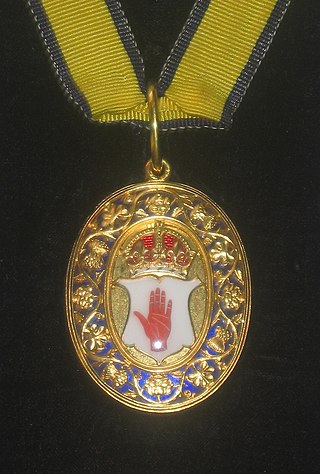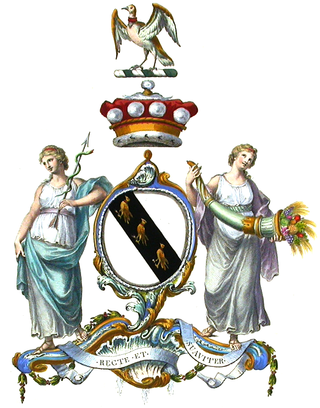Related Research Articles

A baronet or the female equivalent, a baronetess, is the holder of a baronetcy, a hereditary title awarded by the British Crown. The title of baronet is mentioned as early as the 14th century; however, in its current usage it was created by James I of England in 1611 as a means of raising funds for the crown.

Baron Lyttelton is a title that has been created once in Peerage of England and twice in Peerage of Great Britain, both times for members of the Lyttelton family. Since 1889 the title has been a subsidiary title of the viscountcy of Cobham.

Viscount Cobham is a title in the Peerage of Great Britain that was created in 1718. Owing to its special remainder, the title has passed through several families. Since 1889, it has been held by members of the Lyttelton family.

Earl of Chichester is a title that has been created three times, twice in the Peerage of England and once in the Peerage of the United Kingdom. The current title was created in the Peerage of the United Kingdom in 1801 for Thomas Pelham, 2nd Baron Pelham of Stanmer.

Earl of Lonsdale is a title that has been created twice in British history, firstly in the Peerage of Great Britain in 1784, and then in the Peerage of the United Kingdom in 1807, both times for members of the Lowther family.

Earl of Rosse is a title that has been created twice in the Peerage of Ireland, both times for the Parsons family. "Rosse" refers to New Ross in County Wexford.

Earl Jellicoe is a title in the Peerage of the United Kingdom. It was created, along with the subsidiary title Viscount Brocas, of Southampton in the County of Southampton, on 29 June 1925 for Admiral of the Fleet John Jellicoe, 1st Viscount Jellicoe, on his return from being Governor-General of New Zealand, with remainder to the heirs male of his body. He had already been created Viscount Jellicoe, of Scapa in the County of Orkney, on 15 January 1918, created with remainder to the heirs male of his body, and in default of such issue to his eldest daughter and the heirs male of her body, with the like remainder in default of such issue to every other daughter successively in order of priority of birth, and to the heirs male of their bodies. The Jellicoe viscountcy was created with remainder to his daughters and their heirs male because, at the time of the creation, Jellicoe had five daughters and no sons. His only son was born three months later.

Viscount Hill, of Hawkstone and of Hardwicke in the County of Salop, is a title in the Peerage of the United Kingdom. It was created in 1842 for General Rowland Hill. He had already been created Baron Hill, of Almaraz and of Hawkstone in the County of Salop, in 1814, with remainder to the heirs male of his body, and Baron Hill, of Almarez and of Hawkestone and Hardwicke in the County of Salop, in 1816, with remainder to the heirs male of his elder brother John Hill. The viscountcy was created with the same special remainder. On the first Viscount's death in 1842, the barony of 1814 became extinct as he had no male issue, while he was succeeded in the barony of 1816 and the Viscountcy according to the special remainders by his nephew Sir Rowland Hill, 4th Baronet. His son, the 3rd Viscount, sat as a Conservative Member of Parliament for Shropshire North. In 1875, he assumed by Royal licence the additional surname of Clegg, which was that of his maternal grandfather. He inherited financial problems from his father which led to the breakup and sale of the family estates.

Viscount Scarsdale, of Scarsdale in Derbyshire, is a title in the Peerage of the United Kingdom. It was created in 1911 for the prominent Conservative politician and former Viceroy of India George Curzon, 1st Baron Curzon of Kedleston, who was created Earl Curzon of Kedleston at the same time and was later made Marquess Curzon of Kedleston.
Baron Derwent, of Hackness in the North Riding of the County of York, is a title in the Peerage of the United Kingdom. It was created on 10 October 1881 for the former Liberal Member of Parliament for Scarborough, Sir Harcourt Vanden-Bempde-Johnstone, 3rd Baronet. His grandson, the third Baron, was an author, poet and minor diplomat. On his death in 1949 the titles passed to his younger brother, the fourth Baron. He served in the Conservative administrations of Harold Macmillan and Sir Alec Douglas-Home as Minister of State for Trade and Minister of State for Home Affairs. As of 2010 the titles are held by his son, the fifth Baron, who succeeded in 1986.

Baron Rothschild, of Tring in the County of Hertfordshire, is a title in the Peerage of the United Kingdom. It was created in 1885 for Sir Nathan Rothschild, 2nd Baronet, a member of the Rothschild banking family. He was the first Jewish member of the House of Lords not to have previously converted to Christianity. The current holder of the title is Jacob Rothschild, 4th Baron Rothschild, who inherited the barony in 1990.

Baron Ravensdale, of Ravensdale in the County of Derby, is a title in the Peerage of the United Kingdom. It was created in 1911 for the Conservative politician George Curzon, 1st Baron Curzon, of Kedleston, who had previously served as Viceroy of India.
There have been five Dunbar Baronetcies; the first four in the Baronetage of Nova Scotia, and the last in the Baronetage of the United Kingdom. There is also a Hope-Dunbar Baronetcy of Baldoon.

The Cooper, later Paston-Cooper, later Astley-Cooper Baronetcy, of Gadebridge in the County of Hertford, is a title in the Baronetage of the United Kingdom. It was created on 31 August 1821 for the noted surgeon and anatomist Astley Cooper, with remainder, in default of male issue, to his nephew Astley Paston Cooper, third son of his elder brother Reverend Samuel Lovick Cooper, who succeeded as second Baronet in 1841. The third and fourth Baronets used the surname of Paston-Cooper. The sixth Baronet used the surname of Astley-Cooper, which is also used by the seventh Baronet and present holder of the title.
The Hervey-Bathurst Baronetcy, of Lainston in the County of Southampton, is a title in the Baronetage of the United Kingdom. It was created on 7 December 1818 for Felton Hervey-Bathurst, with remainder, failing heirs male of his own, to the heirs male of his father. Hervey-Bathurst was the grandson of the Hon. Felton Hervey, seventh son of John Hervey, 1st Earl of Bristol, and served as an Aide-de-Camp to the Duke of Wellington after the Battle of Waterloo.

The Wedderburn, later Ogilvy-Wedderburn Baronetcy, of Balindean in the County of Perth, is a title in the Baronetage of the United Kingdom created in 1803.
The Campbell, later Cockburn-Campbell Baronetcy, of Gartsford in the County of Ross, is a title in the Baronetage of the United Kingdom. It was created on 3 July 1821 for Lieutenant-General Alexander Campbell, with remainder, in default of male issue of his own, to 1) the male issue of his daughter Olympia, failing which 2) to the male issue of his daughter Isabella Charlotte. He had already been created a baronet on 6 May 1815, with normal remainder to heirs male. Campbell had earlier fought at the Battle of Seringapatam in 1799 and commanded a division during the Peninsular War. The creation of 1815 became extinct on his death in 1824 while he was succeeded in the 1821 creation by Alexander Thomas Cockburn, who assumed the additional surname of Campbell the same year. The fourth Baronet was President of the Legislative Council of Western Australia. The sixth Baronet was the author of the autobiography "Land of Lots of Time".

Sir Benjamin Hingley, 1st Baronet, was an English ironmaster and Liberal politician who sat in the House of Commons from 1885 to 1895.

The Watson, later Kay Baronetcy, of East Sheen in the County of Surrey, was a title in the Baronetage of the United Kingdom. It was created on 5 December 1803 for the merchant and soldier Brook Watson, with remainder failing male issue of his own to his great-nephews William Kay and Brook Kay and the male issue of their bodies. Watson died unmarried and was succeeded according to the special remainder by his great-nephew William Kay, the third Baronet. The title became extinct in 1918, when the sixth baronet was killed in action on the Western Front.
Sir George Benjamin Hingley, 2nd Baronet, (1850–1918) was an English industrialist who was head of the large family firm N. Hingley and Sons Ltd from 1905 until his death in 1918.